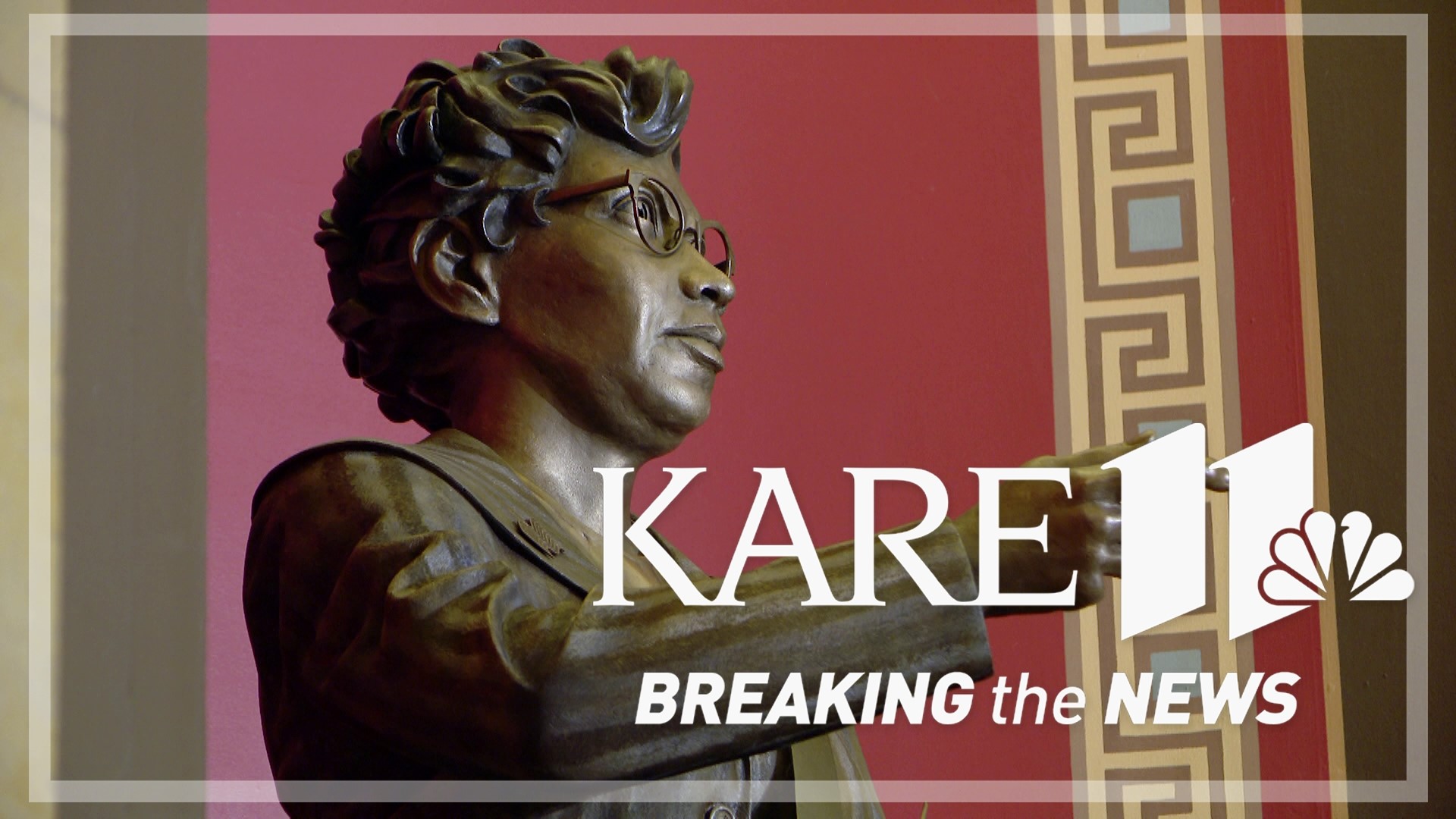ST PAUL, Minn. — Nellie Stone Johnson has been gone for 20 years now, but on Monday, the Minnesota State Capitol Rotunda was filled to overflowing with people who came to honor the iconic Minneapolis labor organizer and civil rights leader.
"The state of Minnesota today was so enhanced and made so much better because of this incredible woman's life," Gov. Tim Walz remarked before formally proclaiming it Nellie Stone Johnson Day in Minnesota.
The occasion was the formal unveiling of the bronze likeness of Nellie, something labor advocates have worked for many years as a way to recognize her pioneering work as an early labor organizer, civil rights advocate, and co-founder of the DFL party.
Nellie Stone Johnson's statue, which now stands in the north portico on the first floor of the Capitol, is the first one depicting a Black woman at the State Capitol, and the only full-body sculpture of an actual historic person of color.
Phyllis Goff, the Immediate Past President of the Minnesota Historical Society Executive Council, formally accepted the statue on behalf of the MNHS, which is the official keeper of State Capitol artworks.
"I am personally proud and humbled and honored because I knew Nellie Stone Johnson and I looked up to her for her quiet and steady leadership, her strength and her courage in fighting for workers and cause of equity and civil rights, not only in this state but the entire country," Goff told the audience.
Nellie Stone Johnson was elected to Minneapolis Library Board in 1945, making her the first Black woman ever elected to any post in the city. Nellie was instrumental in getting the first fair housing and fair employment ordinances passed in Minneapolis.
She became an advisor to Minneapolis Mayor Hubert H. Humphrey, who continued to seek her advice on civil rights and labor issues after he became a U.S. Senator and Vice President.
Humphrey's son, former Minnesota Attorney General Skip Humphrey, said Nellie Stone Johnson never stopped pushing those around her to follow through on the work at hand.
"Here's a woman who was able to do all those things, and if you were sitting next to her like I was on occasion, on a bus, you were being told what to do next!" Humphrey told the Rotunda audience.
"She had this sense of wholeness of where we needed to go, but it was always, 'How are you going to get there? How are we going to make it happen?'"
Former Rep. Joe Mullery introduced a series of bills across the years attempting to get a bust made of Nellie and was thrilled to see that it ultimately blossomed into a full statue. He said that she never lost her zeal for the labor struggle, even during her final years in a nursing home.
"When I visited her in the nursing home one morning, she was too sick to even sit up. I told her that her union was picketing the new owners of the athletic club where she first got her start in the union," Mullery recalled.
"She rolled over onto one elbow and said, 'You go down there and tell my union brothers and sisters to give 'em hell for Nellie!'"
Students from Nellie Stone Johnson Community School, an elementary school located in north Minneapolis, also attended the ceremony, and distributed bookmarks bearing Nellie's image.
Many of those who attended were related to Nellie. Peggy Carpenter introduced herself as Nellie's "grand-niece" rather than "great-niece."
"She didn't like the word 'great.' She liked 'grand.' And we were to address her the same way. She was grand!"
The ceremony was an especially poignant moment for Lt. Gov. Peggy Flanagan.
"I lost my mom on Friday, and she really wanted to be here because growing up, my mom went to Nellie's house after school."
Flanagan was there in her capacity as the chair of the Capitol Area Arts and Architectural Planning Board, or CAAPB, to recognize the sculptor, Tim Cleary, and Paul Mandell, who recently retired after decades as executive secretary of the CAAPB.
Flanagan said her mother's family would take clothes to Nellie to mend. In her later years, she owned and operated Nellie's Zipper and Shirt Repair in downtown Minneapolis.
In a 1988 KARE interview videotaped at her repair shop, Nellie said she kept her eyes and ears on current events.
"I like to write and keep up on everything. I'm always afraid if I miss a newspaper, something will get by me. So, it's a combination of doing this and doing some writing in the field of labor, civil rights and politics," she told KARE.
On that day, sitting at her Singer sewing machine at the age of 82, Nellie said that having grown up on a farm, she wasn't quite prepared for the racial barriers she encountered when she moved to the city in the 1930s.
"I mean, about the whole racial thing. I thought if I was skilled enough to do things I'd go out and get a job. I didn't quite realize there were some stumbling blocks out there."
She kept moving past stumbling blocks and breaking barriers until she died in 2002 at the age of 96.

